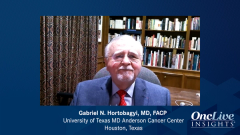
Treatment Advances in HR+ Advanced Breast Cancer
Aditya Bardia, MD, MPH, discusses the current standard of care for HR+ advanced breast cancer and reacts to treatment advances with the availability of CDK4/6 inhibitors.
Episodes in this series

Aditya Bardia, MD, MPH: In terms of historical perspective and outcomes for patients with hormone receptor–positive advanced breast cancer, traditionally, before the approval of CDK4/6 inhibitors, endocrine therapy was the mainstay of management of hormone receptor–positive breast cancer. If you look at outcomes to first-line single-agent endocrine therapy, progression-free survival usually ranged from 1 year to a year and a half and overall survival was somewhere in the range of 3 to 4 years. We’re looking to hit that benchmark of 5 years, but traditionally that hasn’t been possible with single-agent endocrine therapy.
In terms of the management for a patient with hormone receptor–positive metastatic breast cancer, the development of CDK4/6 inhibitors has been a game changer. Several phase 3 clinical trials have demonstrated that the addition of a CDK4/6 inhibitor to endocrine therapy is associated with an improvement in progression-free survival.
More recently we’ve seen data that confirm that the addition of a CDK4/6 inhibitor, such as ribociclib, is associated with improvement in overall survival for both patients with premenopausal hormone receptor–positive breast cancer, as well as postmenopausal hormone receptor–positive breast cancer. Data from MONALEESA-2 presented at ESMO [European Society for Medical Oncology Congress] 2021 showed that patients who receive endocrine therapy aromatase inhibitor with ribociclib had a median overall survival of more than 5 years. For the first time, this benchmark of 5 years was hit with the use of a CDK4/6 inhibitor in combination with endocrine therapy for patients with hormone receptor–positive metastatic breast cancer. I tend to use endocrine therapy with a CDK4/6 inhibitor in the first-line setting, both for patients with premenopausal breast cancer as well as postmenopausal hormone receptor–positive breast cancer.
Transcript edited for clarity.



































